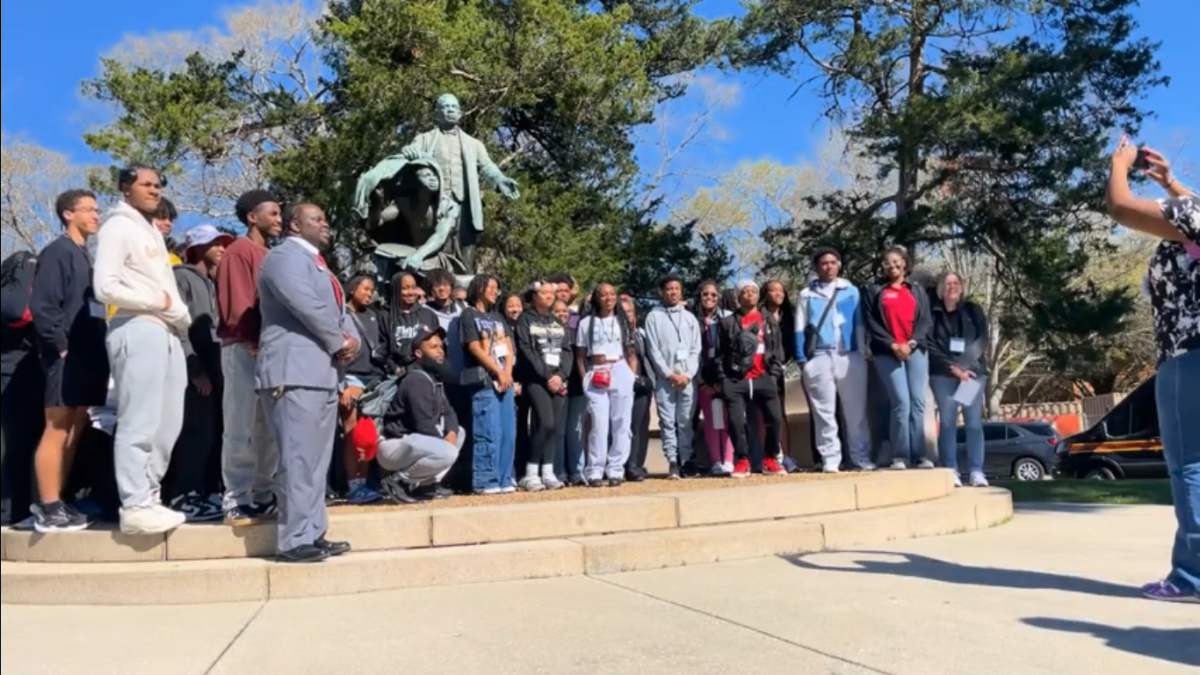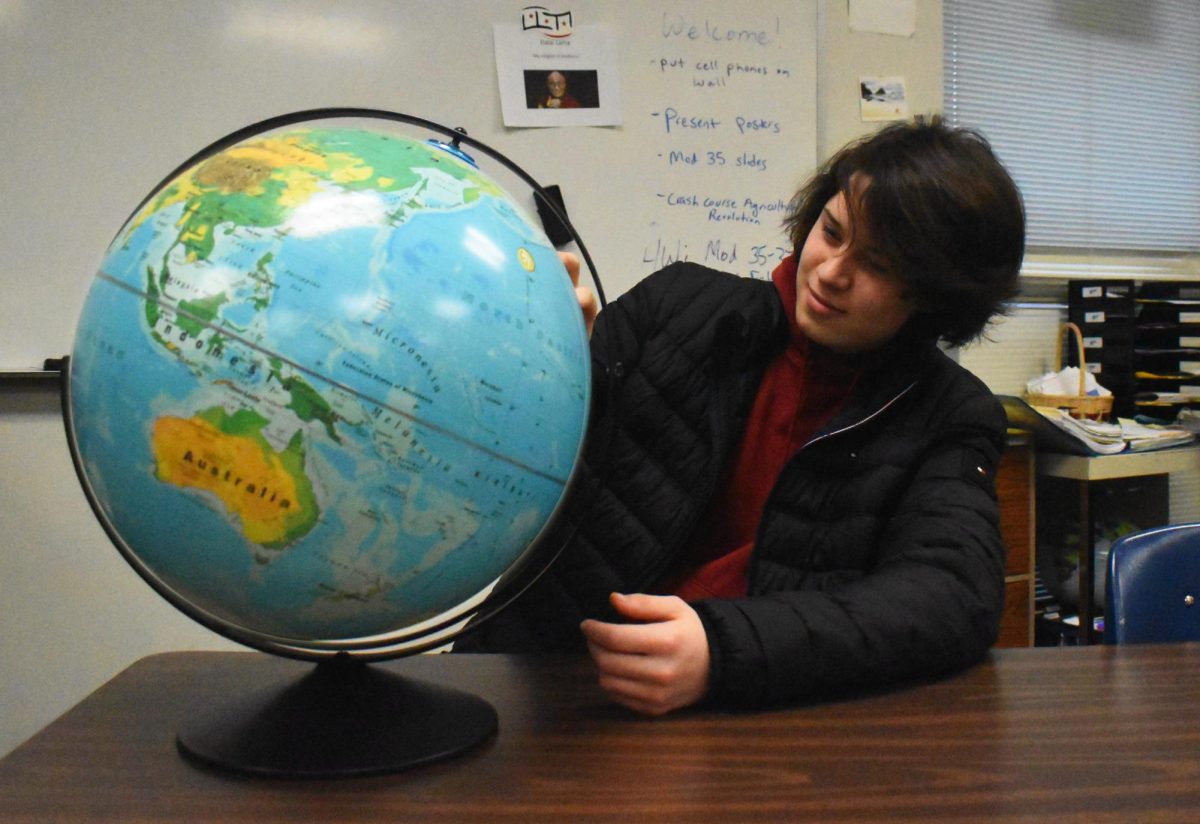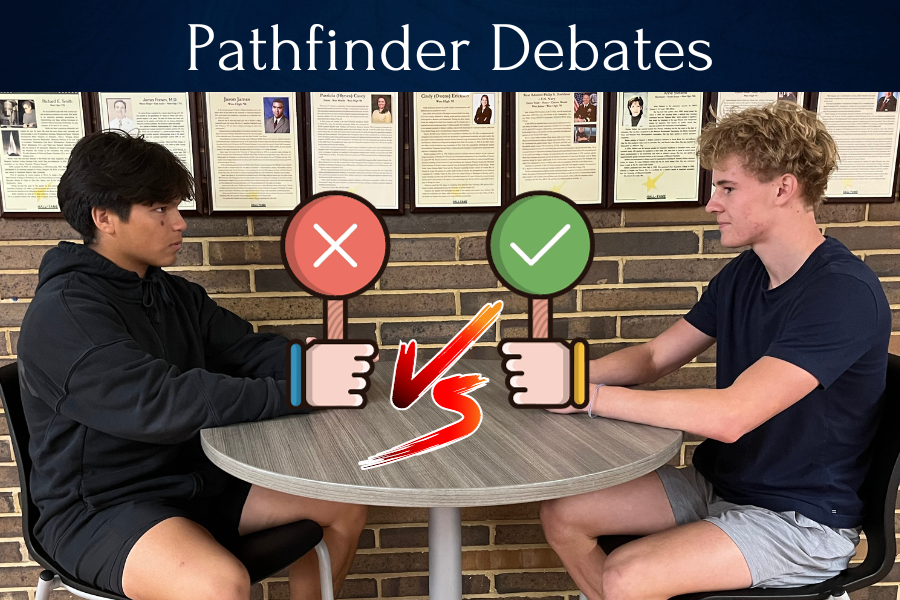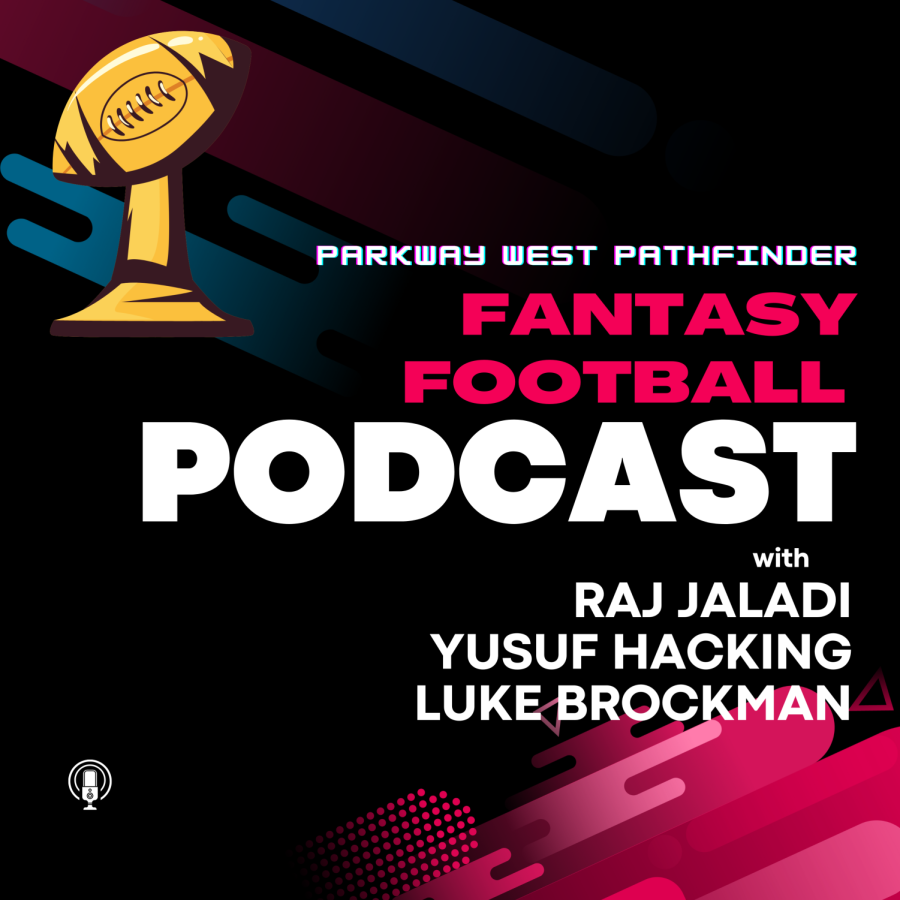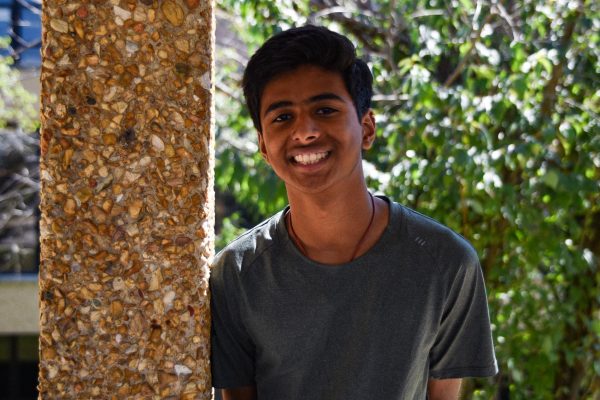Now presenting, Athletes of West, a podcast featuring a unique Longhorn athlete each session.ŌĆŗŌĆŗ We bring you stories from the players, both on the ground and behind the scenes, covering individual accomplishments, records they set and break, endurance and fitness, sports leadership, and many more. Stay tuned!!┬Ā
In this episode, meet Senior Will Bonnett, 2021 Missouri state swimming champion, in the 100 breaststroke and 200-yard individual medley. Listen on, to his journey and the secret behind his success.
Raj Jaladi┬Ā 00:06
I’m Raj Jaladi. And you’re listening to athletes of West, a podcast brought to you by Pathfinder. We’re joined today by swimming state champion, senior Will Bonnett. Will you hold two state champion titles one for breaking the 100 breaststrokes and 200-yard individual medley this year and you’re the second Longhorn athlete to win two state titles in the same season. So how do you feel being a state champion?
Will Bonnett┬Ā 00:29
I think it’s something special for sure. But I’ve never really thought about, like, when I swim, I don’t really think about, oh, I might be to the become state champion, or might win sectionals or whatever it may be. But I think it’s more about racing against yourself for me. Because obviously swimming is a really a personal sport. It’s all about being yourself. And that’s what you know, really makes me excited is when I’m able to perform and do better than past me.
Raj Jaladi┬Ā 00:57
And I guess, how did you do it? What was the work that you put in?
Will Bonnett┬Ā 01:02
So this year, I focused a lot more on breaststroke than in past years. And mostly that’s because I found natural talent in breaststroke. I didn’t swim too much breaststroke up until the end of my junior year. And you know, I started liking it, I’ve always had a really good pressure kick, but I have a really good breaststroke coach, his name is Blair Bish. And he actually swims in the NCAA championships and plays top eight in the 100 102 in a breaststroke, I believe. And so he helped me a ton to get to where I am today,
Raj Jaladi┬Ā 01:36
I guess what are some of your proudest moments?
Will Bonnett┬Ā 01:3
So my biggest, most favorite times are actually one that comes at the right timeline and is one that I wasn’t even there for. I got sick before the quad, which is the Meet that’s all of the Parkway High schools, and our team still won. And I did not think they stood a chance. And they won. And I was like, No way. So that was a super high moment. For me. Another good, really exhilarating moment was at state when we won the first relay, the 200 medley relay. It was neck to neck right into the finish and boom and stole the deal in this 50 freestyle, and it was close. Like I thought we were gonna lose. And we finished well. And I was like, I was too close.
Raj Jaladi┬Ā 02:25
I guess from my experience I face a lot of I have a lot of nerves before the match. And I face a lot of pressure. But I don’t know if it’s any different because I play tennis. And it’s really just me and the ball. And I don’t know what kind of pressure it is in a team sport like swimming.
Will Bonnett┬Ā 02:42
Yeah, so for sure. There’s pressure, I think, whether it’s an individual event or a relay, the pressure can be different. And I think it depends on the type of person you are. For me, I put a lot of pressure on myself to do well. So I can get really stressed out before individual events a lot more so than before a relay. And personally, I find myself thinking through my race. And what I do a lot of is visualization because it helps keep me calm, and keep my heart rate slow. But I also am working on seeing what my race is gonna feel like and be like, and I think it’s really beneficial for me, but that’s just from what I’ve experienced.
Raj Jaladi┬Ā 03:25
And I guess what does it mean to you to represent West anywhere you go?
Will Bonnett┬Ā 03:29
Yeah, it’s huge. I love telling people I get to Parkway West. And I love to think that when people think of my name, they think of Parkway West and have done a lot for me both academically and with swimming and water polo. So I’m extremely proud and we just finished a water polo season. Obviously, we got second. But I’m still happy to represent Parkerway West. And it’s a great school. I think we don’t give it as much credit as it deserves a lot of times, but we have some really special people here.
Raj Jaladi┬Ā 03:56
And you’re going to swim for Brigham Young University. How did you decide on what college you’ll be attending?
Will Bonnett┬Ā 04:02
Yeah, for sure. Swimming was not the only thing that I’d decided where I was gonna go to school. Obviously, I’m a member of church, Christ of Latter-Day Saints, which is the religious school is Brigham Young University. And that has played a big role in me to say to go there. I’ve also my whole life to serve a mission for my church for two years. And so it’s really hard to find a super high-level college that is willing to let you leave for two years and go serve a mission. And Brigham Young will work with me on that. And they’ve done it with a bunch of kids and they know that kids will come back and they’ll be able to get back in shape and swim and do well. So that was a huge part of it. But also academically. BYU has phenomenal programs. Their accounting is number one in the US and they’ve got excellent programs and I’m excited about that and, you know, my siblings both go to school there. So I’m excited to be with them. It should be good.
Raj Jaladi┬Ā 05:04
And what swimming goals do you have for college?
Will Bonnett┬Ā 05:08
Yeah, so my plan right now is to go and swim for one year. And then I’m going to go serve my mission. So I have my goals set out for this year ahead of me. And then I’ll decide where I want to be after the fact after my mission when I get there. But as of right now, my goal for next year is to place top 10 in the NCAA division one championships, which is basically all of division one. And I’m hoping to have certain times that I’m hoping to get so I want to go 51 I don’t care if it’s like a 51 Nine versus a 51, whatever. But I want to do 51 In the 100 breaststrokes, and I want to be like the 155 154 mark in the 100 breaststrokes, or 200. Breaststroke, sorry, that’s where I’m at now, I have some other goals all day, have goals forever that and I’m always pushing and that’s a big part of, of swimming is believing in yourself that you can hit New Times and doesn’t always happen. But always setting those goals. And even if it seems freakishly out there. I remember at the beginning of high school season, I set a goal to go 535,┬Ā in the 100 breaststrokes, and my coach looked at me and was like, Are you crazy because, at that point, my best time was like 56 something or maybe 55. And two seconds is like 100 breaststroke. And I think sometimes people think I’m crazy for setting some of the goals that I set, but you’re never gonna get anywhere if you don’t shoot for something that’s hard.┬Ā
Raj Jaladi┬Ā 06:39
very specific goals, which I think explains a lot. And I guess, what are some of your toughest parts of practice?┬Ā
Will Bonnett┬Ā 06:48
So obviously, practice is a killer for swimming, nobody really wants to stare at a line and be in pain for two hours straight every day. And so getting past that mental block is huge for swimming. And I think the same can be said, for running and a lot of sports, that may not necessarily seem super difficult. As far as tennis, there are a lot of difficult skills, you have to learn right between putting different spins on balls and your serve. And there are lots of different technical points that you can work on. And there are definitely things that you can do for swimming, that are like that. But a lot of is just what’s up here. Because if you can get your mind in a place where you’re not going to give up and where you feel like you’re in a good place with the sport. That’s just as important in my opinion as what your technique looks like. And so I think mastering what mentality you want to have is huge for swimming. And one of my biggest things about that is trying to have a positive outlook on every practice and every swim that you have, even if it doesn’t necessarily go your way. Today at practice, my legs were shot, and I felt like I was gonna die. But at the end of practice, I was like, okay, like I can walk. And I thought, let’s think of three positives from today’s practice. The first one I thought of is that I got to get in 10 minutes late. That was a win. No, my second one is that we get to start off the block. And then my third one was that we didn’t die from the tornado. And so I think having some positives about whatever it was that might have been hard, can change how your brain thinks about it, so that you’re thinking positively about practice. So even if it sucks, you’re practicing. And it’s hard, and your body hurts. If you can take positives in your brain from that, then your brain will switch it and every time you come to practice, you’re like, oh, I have energy. This can be fun. So it’s you’re almost tricking your brain into thinking positively about practice.
Raj Jaladi┬Ā 08:53
Yes, I should, I should use that now. And in tennis practice, if I feel the slightest pain, I’m out. I’m done. Well, I guess I’m curious as to what, or at least what your diet is maybe to be prepared for those scenarios where you’re really exhausted or tired.
Will Bonnett┬Ā 09:09
Yeah, for sure. So eating is huge with basically any sport. Thankfully, swimming allows for a lot of calorie consumption. So I have a lot of room. Excuse me, I have a lot of room to work there. As far as what I’m eating and how much I’m eating. I like to think of three main things in a meeting. The first thing is, am I getting my energy back. So after swimming, the first thing that you want to do is replace your energy. So that’s e that’s easily done with carbs or simple sugars. And so a lot of times what I’ll do is I’ll eat some sort of candy like a chewy, maybe like gummy bears, something like that. Because those simple sugars can replace the energy that you just used really quickly so that then you can move on to your next step which is proteins and that’s where you that’s where you’re making money to go Your proteins. And that’s how you make Bosco and so that’s a second step for me and I like to eat tons of protein, you can never eat enough protein mentally, you’re literally pooping your pants protein. And so I like to eat one gram of protein for every pound of me, which is that’s 180 170 grams of protein right there each day. And so how I get that can depend and vary from day to day, but I like to eat chicken, beef, and pork meats, and I also eat a lot of protein bars. I wish I could show you my pantry. I thought I’ll be right back. But my pantry contains, we got a big old thing. These are all just protein bars, definitely extra. So you can never go wrong. You get protein bars, just grabbing it on the go or whatever. But that’s definitely a staple here at the Bonnett house. I probably do six of these a day. And each one has, you know, about 20 grams of protein. So there’s 120 right there and now itself.
Raj Jaladi┬Ā 11:00
That’s, again, very specific. But I think that you know, explains a lot because I eat whatever if there’s a match tomorrow, but yeah, I could definitely learn a lot from that as well.
Will Bonnett┬Ā 11:10
Do you mind if I add one more thing, I think that it’s less about what you eat, and more about what you’re thinking about when you eat because, to be honest, I don’t eat. I wouldn’t say I eat extremely healthily. I went to coerce tonight, and that was my dinner. So it’s less from me about eating what you what one would say healthy or being really restrictive in your diet or cutting a bunch of things. Because the point of an athlete is you want to have a healthy body. And I think part of having a healthy body is balance. And that means eating ice cream every once in a while when you’re wanting when you’re craving ice cream or eating cake when there’s cake on the table. And it’s somebody’s birthday. But I think that that balance is key.
Raj Jaladi┬Ā 11:53
Yeah. And speaking of balance, I only play one season, one sport, and balancing my academics with just that one season definitely is very difficult. So I’m curious as to how you play winter and spring how you manage between academics and how you play a tough match and go home to prepare for a big test the next day?
Will Bonnett┬Ā 12:19
I think I think it can be really difficult and mentally straining, especially when you just got home from a really hard practice, or you just had a game, or whatever it could be. And you’re like, Oh man, I had this assignment student night and it’s gonna suck. Thankfully, for me, I got cut out of a lot of homework from COVID, my junior year was probably not as bad as yours will be. And so I thank my lucky stars that I got away with that a little bit. But this year, and especially my sophomore freshman year, it’s just a lot about having a positive attitude, I think because it does, when you’re tired, and you’re hungry, and you are like I have to do this assignment, I think trying to be as positive as you can is key to that. I think music can help with that. I listen to a lot of music, or any kind of music, rap, country, classical or whatever, whatever kind of helps you get into a mode of focus is, you know, is good. I think another thing is time management is huge as a an academic athlete and being able to sit down your phone and say, I’m going to knock this out, and I’m going to be done. And then I’m going to go to bed or then I’ll get to be on my phone for a little bit and then I’ll go to bed. I think that can be more beneficial than just me talking to you and then going into my phone and starting talking to somebody and then coming back and forth because you just waste time that way.
Raj Jaladi┬Ā 13:45
And I bet there’s not much time left. But do you do anything outside of school sports and academics and extracurriculars?
Will Bonnett┬Ā 13:56
Yeah, for sure. I’m involved with my church quite a bit. We have meetings every Sunday, and then I have mutual on Wednesdays, and I used to do scouting a lot up until the past few years, I got my Eagle Scout, I think the key for finding time to do things that you want to do is finding things you want to do. Because what I’ve found is that if there’s something that you want to do or that you enjoy doing, you will find time for it. I think you could probably say the same thing. Most weed smokers, people who smoke weed are going to find time to smoke weed if they want to. So if you find things that you enjoy, like me, I love cars, right? On a Saturday morning after some practice, you know that I’m dead tired and could go back to sleep. Instead, you might find me on the driveway washing my car, just because that’s what things that motivate me and that’s your extacurricular.. And I think that trying different things and finding things that you enjoy doing yourself are key to finding other things to enjoy in life. So it makes sense.┬Ā
Raj Jaladi┬Ā 14:58
it makes sense and it feel like you have time for any social activities as well.┬Ā
Will Bonnett┬Ā 15:03
In addition, I practice a lot. And it keeps me busy. But like I said, I think going back to what you enjoy, if you enjoy hanging out with people, if you’re an extroverted person, I think you’ll find time and there’s plenty of time. It’s just about what you prioritize. Sometimes I’ll sacrifice sleep and end up getting six hours of sleep before my Saturday morning practice and hanging out with my friends on Friday night. But I think that people need people that are a huge part of life is being able to interact and talk about people. And one of those things is finding people that enjoy the same things as you, right? Because let’s say, that you and I are both swimmers. And then after swim practice, I’m like, Hey, Raj, do you want to go to Chipotle and get some food? Or do you want to go get Smoothie King? Like things like that are? Good, because you have something in common? And that’s a good social activity where you can get to know people on your team and have social.┬Ā
Raj Jaladi┬Ā 16:07
Do you have a role model? And if so, why is that certain person?┬Ā
Will Bonnett┬Ā 16:12
That’s a great question. I have a lot of people that I like to look up to, I think my parents are a great example to me. My dad is really a leader. And he’s taught me a lot of skills about being a leader. And I’m really grateful for all that he’s done for me. And my mom has basically gotten me through high school by helping me stay organized, driving me between different things when I couldn’t drive.┬Ā Another huge role model for me, I would say is Caleb Dressel. He’s a swimmer. And he, I think, what I like about him the most is that he is really there’s a lot of elite athletes who feel like they’re better than everybody else and talk to other people. And Caleb is not like that. Basically, anybody can walk up to him, and he would love to talk to them. He’s just a really genuine person. And he’s a seventh-time Olympic gold medalist. And he is jacked too, he doesn’t seem like the kind of person that would be like, oh, yeah, I just want to talk to you. Let’s go get lunch or we could talk. But he’s just like that. And he just loves talking to people. And so that’s really inspiring to me to see somebody who really enjoys people, and is really good at their sport too
Raj Jaladi┬Ā 17:24
And this is just a question that I had in mind. Did you swim before high school. Did they have opportunities where you can go and compete in tournaments? Do they have that for swimming as well?
Will Bonnett┬Ā 17:39
I swim for a Club, which is called Parkway Swim Club. And that club is year-round. And they practice like I had practice today that we practice every day. And there are plenty of other clubs, there’s CSP and fast and rockwood. And there’s a bunch of other programs and we hold meets with just those teams. There’s bigger meet, there’s a meet called sectionals, which is with the closest six states or maybe eight states, there are Junior nationals, which is all of America. And we go to meets, like there’s a meet called Pisces, which is international meet. And we have kids from the Dominican Republic there and all kinds of places. But I think that the answer to that question is, yes, there are plenty of opportunities to swim and tons of meets. And if you want to get involved, you can do basically whatever you want.
Raj Jaladi┬Ā 18:34
Yeah. And I guess Finally, and this includes me, by the way, what is your advice for not just other swimmers, but people who aspire to be like you?
Will Bonnett┬Ā 18:42
I think my biggest piece of advice is to stay positive. It’s being a hardcore athlete is not always fun, but it’s really rewarding. And when it’s rewarding, it’s worth it. And I think being willing to put in the hard work so that people can see what you’ve accomplished is not only impressive but admirable. And yeah, if you have goals and aspirations go get them.┬Ā
Raj Jaladi┬Ā 19:08
Thank you so much Will. Thank you for listening to this podcast. Next up on the series. We have a tennis team captain Drew Boone


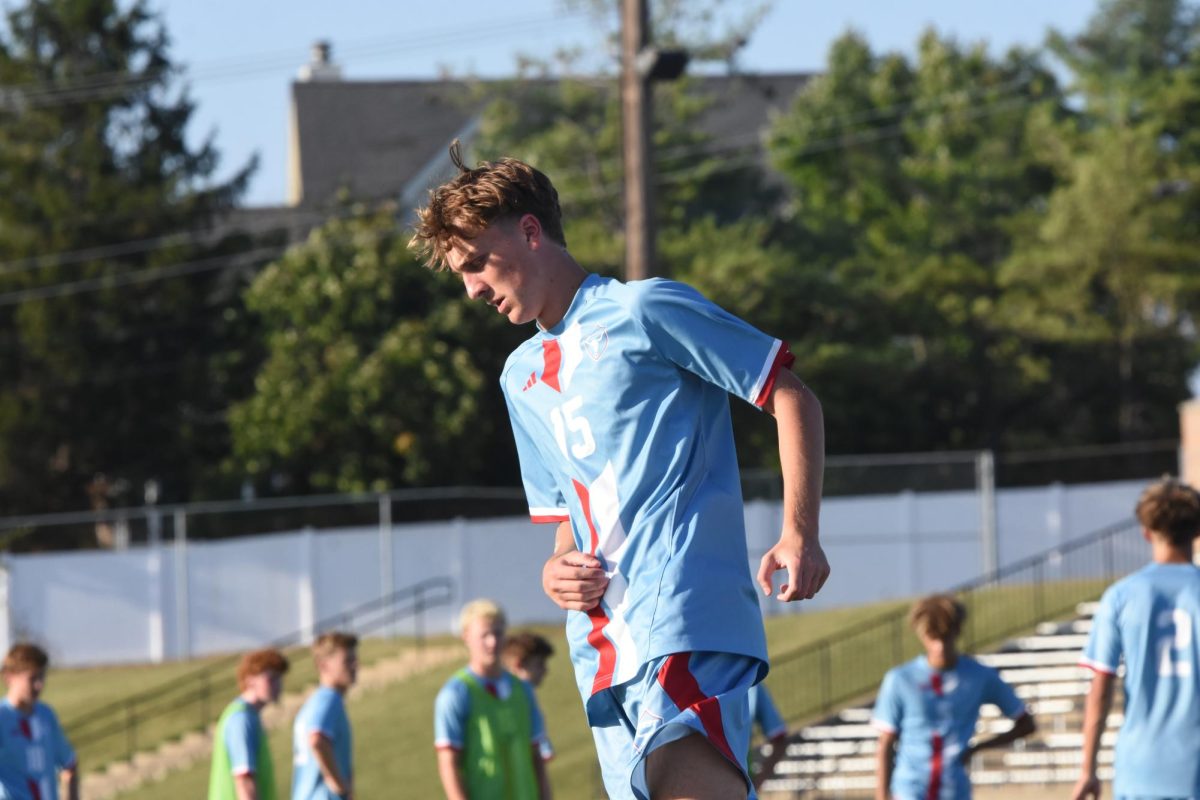
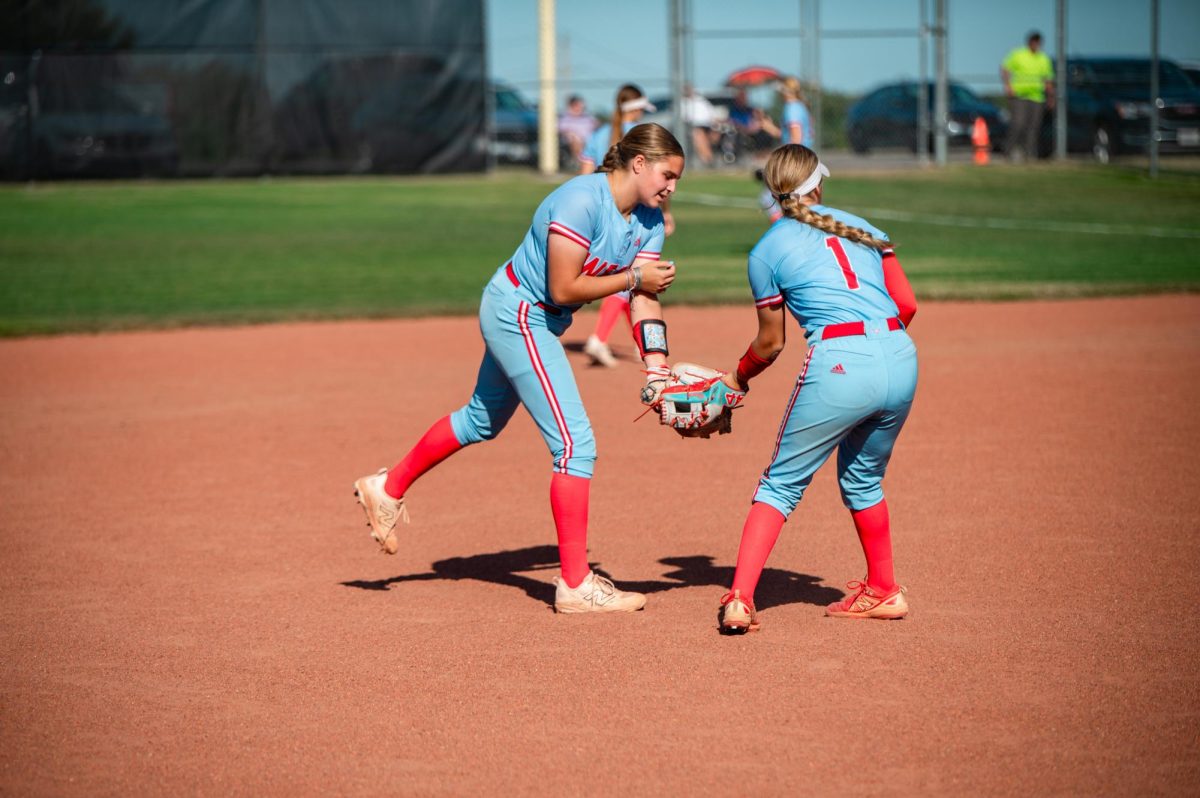



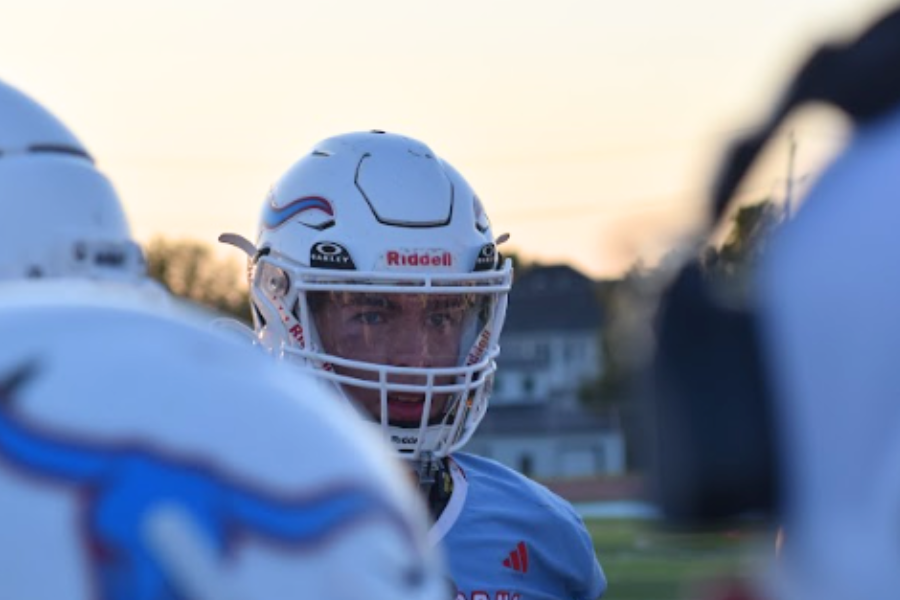
![In perfect shooting form and with eyes on the rim, junior Tyler Kuehl is about to shoot his next basket in the last game of the season against Marquette High School. Kuehl has been playing basketball since he was 5. ŌĆ£Even though I played basketball all my life, the game-winning shots can be pressure, it's confidence. If you're going into that shot and not thinking that you're gonna make it, it's obviously not going in. And if you believe, [it will]. That's the only way you can succeed,ŌĆØ Kuehl said.](https://pwestpathfinder.com/wp-content/uploads/2024/01/unnamed-32-1-1200x1200.png)


![Performing as Nibs in ŌĆ£Lost Girl,ŌĆØ junior Avery Hermann inspects a drawing of Neverland made by the showŌĆÖs main character, Wendy Darling. Hermann not only acted in ŌĆ£Lost GirlŌĆØ, but he also served as assistant director of the show. ŌĆ£I found ŌĆśLost GirlŌĆÖ to be a beautiful and touching story, and IŌĆÖm really glad I got to be a part of it. My favorite part of the show [was] my work as assistant director. I spent a lot of time working with every [cast member] on character, deliveries and emotional development. It was so amazing to see these brilliant actors come to life on stage in such a colorful way,ŌĆØ Hermann said.](https://pwestpathfinder.com/wp-content/uploads/2025/11/DSC_1258-Enhanced-NR-1-1200x798.jpg)
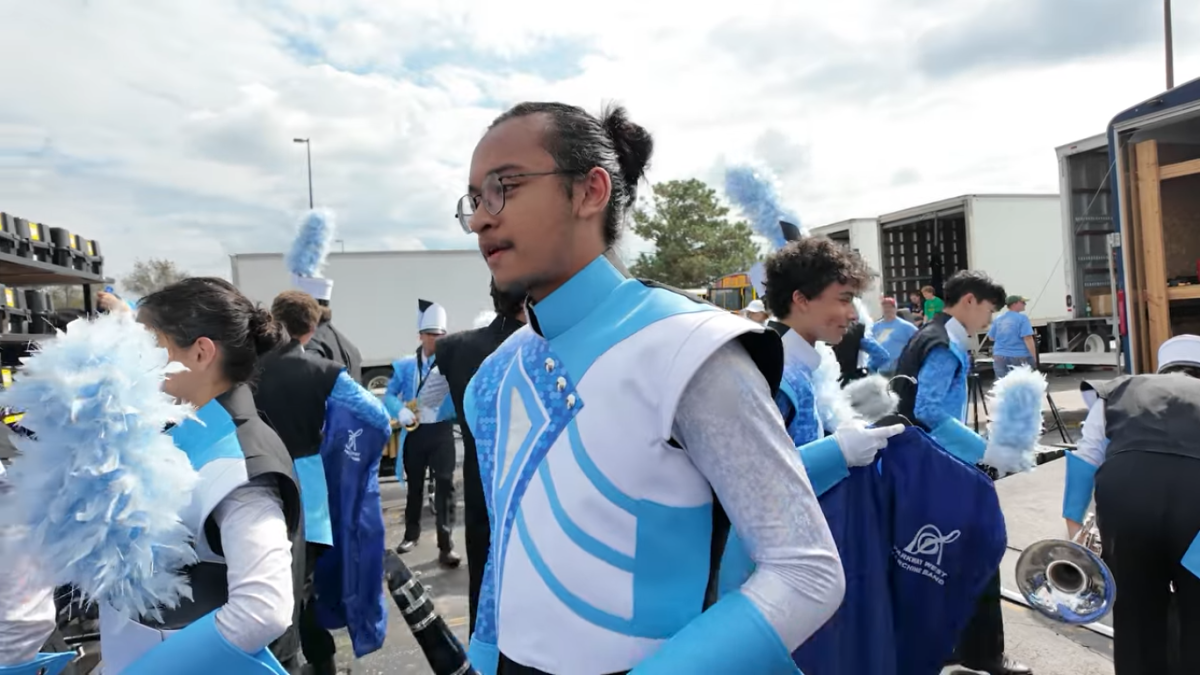
![Standing in front of the camera and next to Fox 2 News' Ty Hawkins, senior and varsity football player JaMont Brooks represents the varsity football team. As captain and outside linebacker, Brooks was one of four students selected to be interviewed live for the broadcast. ŌĆ£Overall, it was just a crazy experience being on the news. Even when I get older, IŌĆÖll tell my kids or grandkids I was on the news. My mom sent me a picture of me on the news [saying] ŌĆśOh my gosh, thatŌĆÖs my son.ŌĆÖ The Parkway West community felt amazing this morning. Everybody showed up at 6 [a.m.] and [will] show up 6 [p.m.] tonight too. Any time I go into a game, I go up there with the mentality that weŌĆÖre going to try our best, and even the times we struggle, [IŌĆÖll] keep my head up,ŌĆØ Brooks said.](https://pwestpathfinder.com/wp-content/uploads/2025/10/DSC8122-Enhanced-NR-1200x799.jpg)
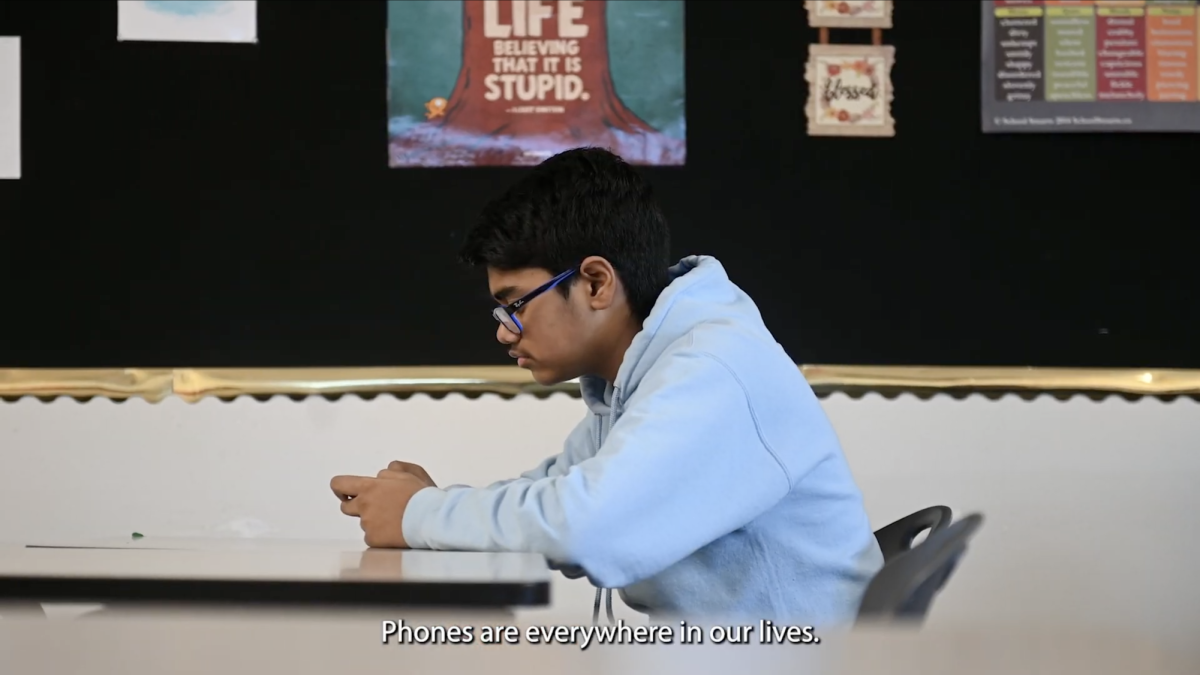
![Blue lights shining brightly, senior Riley Creely beatboxes into the microphone. Creely and the group began the performance in front of the blue lights, sparking interest from the audience. ŌĆ£The pep rally performance was fun. I got to beatbox for the first half of the song, which was hype. I liked to look into the student section [while I performed],ŌĆØ Creely said.](https://pwestpathfinder.com/wp-content/uploads/2025/09/DSC_5085-Enhanced-NR-1200x799.jpg)
![Leaping through the air, senior Tyler Watts celebrates his first goal of the season, which put the Longhorns up 1-0 against the Lafayette Lancers. Watts decided to play soccer for West for his last year of high school and secured a spot on the varsity roster. ŌĆ£[Playing soccer for West] is something I had always dreamed of, but hadnŌĆÖt really had a good opportunity to do until now. ItŌĆÖs [really] fun being out [on the field], and IŌĆÖm glad I decided to join the team. ItŌĆÖs just all about having fun with the boys and enjoying what time we have left together,ŌĆØ Watts said.](https://pwestpathfinder.com/wp-content/uploads/2025/09/DSC_1951-1200x855.jpg)
![Sophomore Natalie House pitches the ball during an intrasquad scrimmage for Red and Blue Night on Aug. 22. House played catcher for the varsity softball team. ŌĆ£I started [playing] softball when I was five. My brother played baseball, and I wanted to start sports like him. Scrimmaging against our own team is always kind of difficult because we all know each other's [weaknesses],ŌĆØ House said.](https://pwestpathfinder.com/wp-content/uploads/2025/09/DSC7191-1-1-1200x844.jpg)
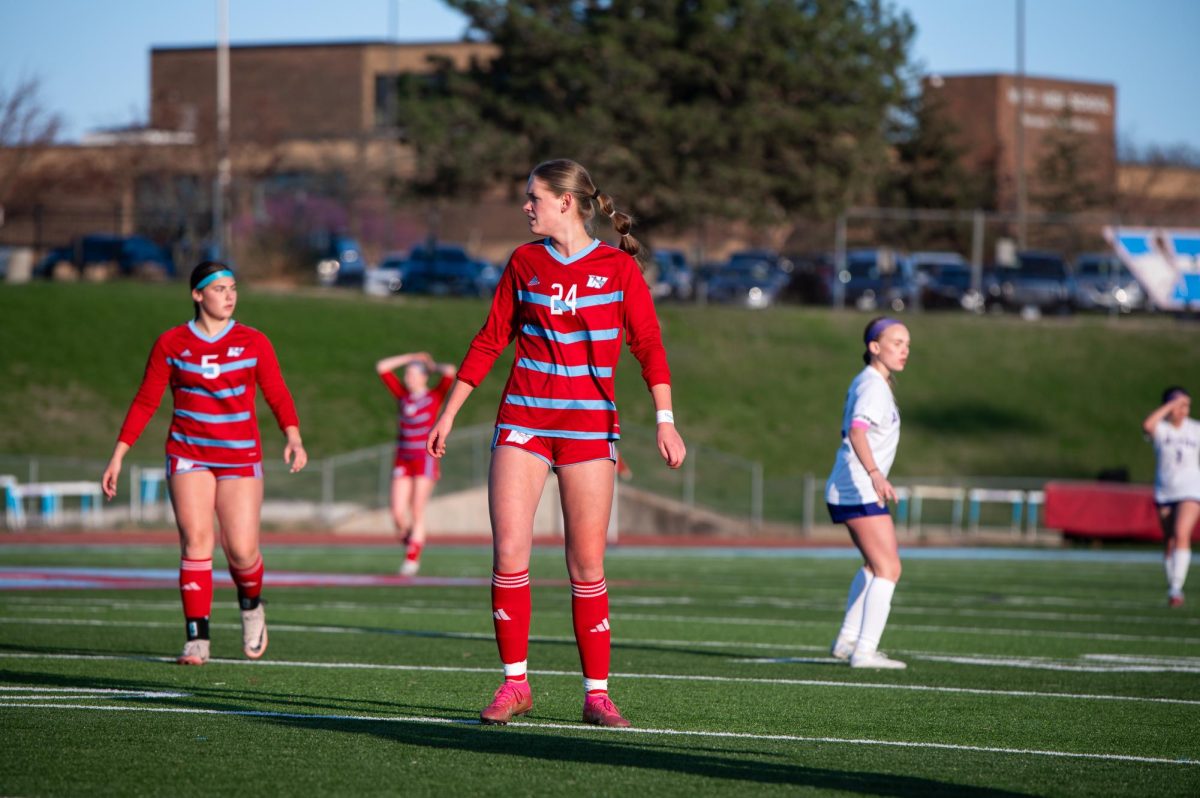
![Blending harmonies with dynamic control, senior Spencer Rahm takes the stage as part of the jazz choir's spring performance. Jazz Coffee House took place on April 22, marking the culmination of months of preparation by West HighŌĆÖs musicians. ŌĆ£To me, [choir] is an opportunity every day to get to sing with my friends and work on our songs that we have concerts for. [Seeing] the results after working together with people is really rewarding. Jazz Coffee House concert was a reflection and a result of all the hard work we've put in the last three months,ŌĆØ Rahm said.](https://pwestpathfinder.com/wp-content/uploads/2025/05/DSC_0214-3-1200x800.jpg)
